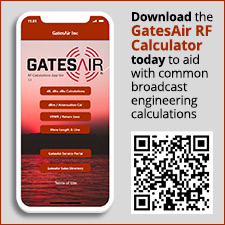.gif)
CENTRO DE MEDIOS
Noticias
Field Tests of FUTURECAST™ Next-Gen TV Broadcast System First to Demonstrate ‘Physical Layer’ Capabilities of 4K and Robust Mobile Transmission for ATSC 3.0
Real-World Overnight Trials of FUTURECAST Hardware in Wisconsin Shows Simultaneous Reception of 4K Ultra HD and Mobile TV Signals
Madison, WI, October 22, 2014
While most TV viewers in Wisconsin’s capital city were fast asleep, the future of television broadcast technology was witnessed early this morning by a select group of broadcast industry professionals and expert viewers.
The next big step in terrestrial TV broadcasting is being demonstrated in Madison this week at Quincy Group’s WKOW-TV, which is conducting a second round of real-world broadcast field testing with the FUTURECAST™ Universal Terrestrial Broadcasting System.
Photos from the earlier Field Test in August can be downloaded from this link:
http://bit.ly/FUTURECASTMadisonDemo
A short video about FUTURECAST and the Madison Field Test is available for posting and download from this link:
https://vimeo.com/109472583
FUTURECAST is a leading contributor to the optimal “physical layer” solution at the heart of the next-generation ATSC 3.0 broadcast standard, which is being standardized by the Advanced Television Systems Committee. FUTURECAST was co-developed by LG Electronics, its U.S. R&D subsidiary Zenith, and GatesAir as the foundation of next-generation terrestrial broadcasting in the United States and around the world.
Results from initial field tests completed in August – the first over-the-air broadcast trials of a compete ATSC 3.0 Physical Layer system – show how FUTURECAST can deliver 4K Ultra HD content and two robust mobile TV streams in a single 6-Megahertz channel, while optimizing indoor reception and offering unparalleled spectrum efficiency.
The summer field test in Madison collected nearly 50,000 pieces of data from scores of reception sites including challenging reception areas inside buildings, in fast-moving vehicles and at locations ranging from downtown to 50 miles from the transmitter. This week’s follow-up testing is evaluating performance of hardware and software enhancements and sharing the experience with key members of the broadcast and TV industries.
Today’s three-hour FUTURECAST broadcasts on WKOW’s Ch. 26 (PSIP 27), which began at 1 a.m., allowed outside observers (including representatives of the Wisconsin Broadcasters Association) to see what’s possible with the new transmission system.
“It’s exciting to play a role in the establishment of next-gen standards that will usher in the future of television,” said Brady Dreasler, chief engineer for Quincy Group, parent company of WKOW-TV in Madison. “Based on what I’ve seen in these FUTURECAST tests, the new standard will enable exciting new business models for broadcasters and exciting new services for viewers.”
The FUTURECAST Universal Terrestrial Broadcasting System is designed to provide the optimized combination of broadcasting capabilities for fixed, portable and mobile use. Flexible parameters allow broadcasters to mix diverse services – from fixed 4K reception to deep-indoor handheld reception to high-speed mobile reception – in a single RF channel with maximum efficiency.
“Initial testing results show the promise of the ATSC 3.0 standard to redefine television broadcasting. The FUTURECAST system is designed to fully meet broadcasters’ requirements for the ATSC 3.0 physical layer and advances the goal of moving rapidly to next-gen broadcasting,” said Dr. Skott Ahn, President and Chief Technology Officer, LG Electronics, co-developer of the FUTURECAST system.
Rich Redmond, Chief Product Officer for FUTURECAST co-developer Gates Air, said, “FUTURECAST, which we first demonstrated for the broadcast industry at April’s NAB Show, represents technology breakthroughs that will give broadcasters the transmission technology needed to support new business models, including mobile and LTE network offload, and compete effectively in the 21st Century.”
Expected to redefine TV broadcasting for decades to come, the overall next-generation broadcast television system will require higher capacity to deliver 4K Ultra-High-Definition services, robust reception on mobile devices and improved spectrum efficiency, according to the ATSC.
Key elements of the FUTURECAST system include:
- Data throughput increases of 30 percent and improved multipath performance (compared with the current DTV standard) for fixed and portable TV reception;
- Energy-saving features for consumer receivers and enhanced indoor TV signal penetration for mobile reception thanks to flexible system parameter choices;
- Advanced modes for delivery of very high data rates and very robust transmission capabilities;
- State-of-the-art error correction coding and signal constellations;
- Future Extension Frames to support evolution of future broadcast systems; and,
- Improved single frequency network service.
The increased payload capacity of the physical layer combined with HEVC encoding will allow broadcasters many more options when planning their broadcast service offering.
Designed for easy extension to various current and future transport formats, FUTURECAST optimizes efficiency for the most-used data formats (Internet Protocol, Transport Stream) via customized stream compression.
The system supports single-frequency networks and/or multiple transmitters, and its use of a single RF transmission’s flexible physical layer profile assures optimum quality of service. The extensible new system is designed to support evolution to future broadcast systems even beyond ATSC 3.0.
FUTURECAST’s superior RF approach addresses the co-channel and adjacent-channel interference challenges related to the anticipated UHF spectrum repacking.
The FUTURECAST Universal Terrestrial Broadcasting System is the latest collaboration among LG, Zenith and GatesAir, co-inventors of the transmission system behind the ATSC A/153 Mobile Digital TV Standard, adopted by the industry in 2009. Zenith invented the core transmission system at the heart of today’s ATSC A/53 Digital Television Standard, approved by the Federal Communications Commission in 1996.
# # #
Contact info:
John Taylor
LG Electronics USA - Zenith
847-941-8181
john.taylor@lge.com
Dave Arland
FUTURECAST - Arland Communications
317-701-0084
dave@arlandcom.com
Brian Galante
GatesAir - Dimension PR
207-494-8428
brian@dimensionpronline.com










